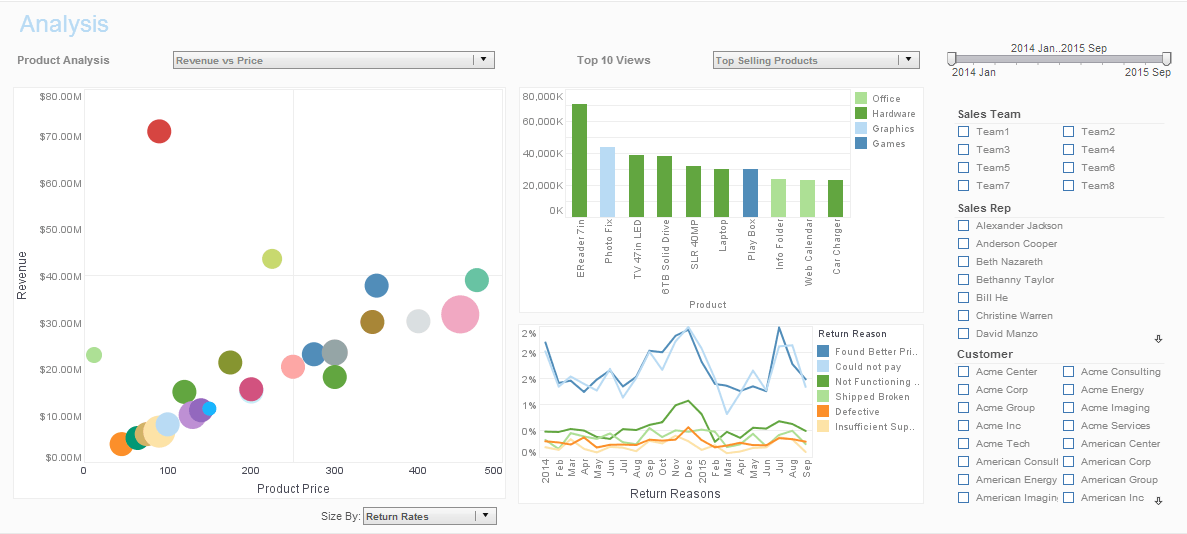Free Chart Tools
Looking for free chart tools? InetSoft provides both free and commercial chart tools. Click the Start Free button and register with any email address, including free email services such as Google and Yahoo. There is no credit card required. Use the 100% web app with no desktop install. Collaborate online in real time. Use data sources such as uploaded Excel or CSV files or connect to live Google sheets. Publicly share dashboards, if you wish, via URL link. All advanced data visualization types and interactive controls are available.
Documentation
Coordinate.transpose()
Interchanges the axes. For example, in a rectangular coordinate system, the X-axis becomes the Y-axis, and the Y-axis becomes the X-axis.
Example (Report or Viewsheet) importPackage(inetsoft.graph)
importPackage(inetsoft.graph.data)
importPackage(inetsoft.graph.scale)
importPackage(inetsoft.graph.aesthetic)
importPackage(inetsoft.graph.element)
importPackage(inetsoft.graph.coord)
var arr = [["State", "Quantity"], ["NJ", 200], ["NY", 300]];
dataset = new DefaultDataSet(arr);
graph = new EGraph();
var elem = new IntervalElement("State", "Quantity");
var sscale = new CategoricalScale("State");
var qscale = new LinearScale("Quantity");
var coord = new RectCoord(sscale,qscale);
coord.transpose()
graph.setCoordinate(coord);
graph.addElement(elem);
PolarCoord
The PolarCoord object contains polar coordinates against which data can be represented. To create a PolarCoord object, call the PolarCoord constructor:
var polar = new PolarCoord(rect);
You can pass a RectCoord object to the constructor (e.g., 'rect'), or specify this later using the PolarCoord.setCoordinate(coord) property.
Example (Report or Viewsheet) importPackage(inetsoft.graph)
importPackage(inetsoft.graph.data)
importPackage(inetsoft.graph.scale)
importPackage(inetsoft.graph.aesthetic)
importPackage(inetsoft.graph.element)
importPackage(inetsoft.graph.coord)
var arr = [["State","Quantity"], ["CA",200], ["NY",300]];
dataset = new DefaultDataSet(arr);
graph = new EGraph();
var elem = new IntervalElement("Quantity");
var yscale = new LinearScale("Quantity");
var rect = new RectCoord(null, yscale);
var polar = new PolarCoord(rect);
var frame = new CategoricalColorFrame();
var range = new StackRange();
polar.setType(PolarCoord.THETA);
frame.setField("State");
elem.setColorFrame(frame);
elem.setCollisionModifier(GraphElement.MOVE_STACK);
yscale.setScaleRange(range);
var spec = new AxisSpec();
spec.setLabelVisible(false);
spec.setTickVisible(false);
spec.setLineVisible(false);
yscale.setAxisSpec(spec);
graph.setCoordinate(polar);
graph.addElement(elem);
PolarCoord.setType(value)
Specifies the type of polar transformation.
Parametervalue PolarCoord.THETA (use only angle) PolarCoord.THETA_RHO (use angle and radius) PolarCoord.RHO (use only radius) PolarCoord.PLUS (angle & radius, with hole)Example (Report or Viewsheet)
importPackage(inetsoft.graph)
importPackage(inetsoft.graph.data)
importPackage(inetsoft.graph.scale)
importPackage(inetsoft.graph.aesthetic)
importPackage(inetsoft.graph.element)
importPackage(inetsoft.graph.coord)
var arr = [["State","Quantity"], ["CA",200], ["NY",300]];
dataset = new DefaultDataSet(arr);
graph = new EGraph();
var elem = new IntervalElement("Quantity");
var yscale = new LinearScale("Quantity");
var rect = new RectCoord(null, yscale);
var polar = new PolarCoord(rect);
var frame = new CategoricalColorFrame();
var range = new StackRange();
polar.setType(PolarCoord.THETA);
frame.setField("State");
elem.setColorFrame(frame);
elem.setCollisionModifier(GraphElement.MOVE_STACK);
yscale.setScaleRange(range);
var spec = new AxisSpec();
spec.setLabelVisible(false);
spec.setTickVisible(false);
spec.setLineVisible(false);
yscale.setAxisSpec(spec);
graph.setCoordinate(polar);
graph.addElement(elem);
PolarCoord.setCoordinate(coord)
Specifies the rectangular coordinates on which the polar coordinates should be based.
Parametercoord a RectCoord objectExample (Report or Viewsheet)
importPackage(inetsoft.graph)
importPackage(inetsoft.graph.data)
importPackage(inetsoft.graph.scale)
importPackage(inetsoft.graph.aesthetic)
importPackage(inetsoft.graph.element)
importPackage(inetsoft.graph.coord)
var arr = [["Direction", "Score"], [(Math.PI/2),20],
[(Math.PI/4),30], [(Math.PI),35]];
dataset = new DefaultDataSet(arr);
graph = new EGraph();
var elem = new PointElement("Direction", "Score");
var xscale = new LinearScale("Direction");
var yscale = new LinearScale("Score");
yscale.setMin(0);
yscale.setMax(40);
xscale.setMin(0);
xscale.setMax(1.95*Math.PI);
xscale.setIncrement(Math.PI/8);
var rect = new RectCoord(xscale,yscale);
var polar = new PolarCoord();
polar.setCoordinate(rect);
graph.setCoordinate(polar);
graph.addElement(elem);
More Resources About Charting Tools
Evaluate InetSoft's Predictive Analytics Application - InetSoft offers a powerful BI Solution coupled with predictive analytics enabling organizations harness existing data to the fullest. InetSoft is top-rated by users on G2 Crowd. Interact with examples and register for a personalized demo...
15 KPIs That Are Specific to the Insurance Industry - Key Performance Indicators (KPIs) are used to measure the performance and efficiency of an insurance company. The information from KPIs is invaluable in assisting insurance companies to identify areas they succeed in and areas that require more work, focus, and resources. The most common KPIs include: Quote Rate Quote rates are fundamental in an industry where speed and exceptional service can make or break the business. A quote is usually a potential client's first interaction with an insurance company, so it must be accurate and sent timeously. A quote rate looks at how many quotes an insurance broker compiled and supplied compared to the number of leads they contacted...
Kickstarter Analytics Dashboard Example - From art to technology, crowdfunding projects are making a lasting impact on society, culture, and the economy. Kickstarter, the largest crowdfunding platform in the United States, has helped fund 221k creative projects successfully, generated $13.5 billion in economic impact, boosting overall employment. In the future we can expect the crowdfunding industry to grow even more. Yet, despite all the impressive numbers and potential, there remains common threats in recent years, from the Covid pandemic to financial recession...
KPIs and Analytics for Sales Operations - Analytics and KPIs are crucial for monitoring and assessing the efficacy of sales activities. Sales operations analysts may find areas for improvement and put plans in place to maximize sales performance by monitoring KPIs and analyzing data. The KPIs and analytics that sales operations analysts employ include the following: Sales Revenue The entire amount of income produced by sales operations during a certain time period is referred to as sales revenue. This KPI is essential since it offers a crystal-clear picture of the state of the company as a whole. Sales operations analysts monitor progress toward sales goals and identify areas for improvement using sales revenue data...
Tracking Fake Accounts by State with a Regional Map - Another important feature of InetSoft's fraud management dashboard is the ability to visualize data in a clear and intuitive way. InetSoft's product allows users to create interactive dashboards that can display data in various formats, such as charts, graphs, and maps. For example, a map could be used to show the geographical distribution of fake accounts, while a chart could be used to track the number of fake accounts over time...
Vendor Performance Metrics - Vendor Scorecards: Vendor scorecards are a popular tool for assessing and contrasting vendor performance in comparison to predetermined standards. These scorecards often incorporate measures like on-time delivery, product or service quality, contractual compliance, and client satisfaction. Service Level Agreements (SLAs) Compliance: SLAs outline the performance criteria and anticipated service levels that suppliers must adhere to. To determine the vendor's capacity to satisfy predetermined goals, such as response times, uptime, or resolution rates, vendor management analysts monitor SLA compliance...
